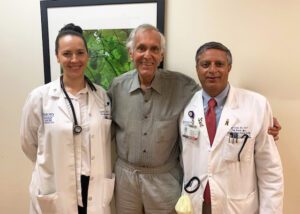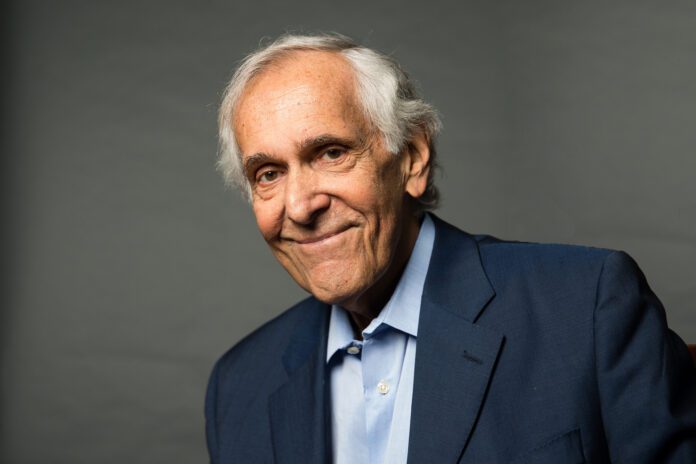Longtime Atlanta resident Dave Walbert was sitting in a recliner reading a book for about an hour. When he stood up, he suddenly felt a “little tweak in a muscle” in his back, he says. He often jokes about how a pulled muscle heals quickly at age 18. “But when you’re 40, it takes a week,” he says. “And when you’re 60, it takes weeks. When you’re 70 or 75 and pull a muscle, you’re going to live with it the rest of your life.”
When the pain didn’t go away, Dave visited an orthopedic surgeon to see what might be wrong with his back. She said he had a compound fracture, and an outpatient procedure would fix it. As a next step, she ordered an MRI to get a more detailed image of Dave’s spine before completing the procedure.
Dave says he will never forget the words in the radiologist’s report on his MRI results. “Extensive metastatic bone cancer,” it read. “That’s a bit of a shocker,” Dave says. “You don’t know if you’re going to be alive in a month or not when you get that.”
Getting to a Diagnosis
Fortunately, Dave’s wife knew an oncologist who had practiced at Emory Healthcare and was also the chief medical officer of the American Cancer Society. “He knew everybody and everything, really, about cancer and not just in the United States, but around the world,” says Dave.
Together Dave and his oncologist friend ticked down the list of potential types of primary cancers that could be causing the spread of cancer to Dave’s bones. Prostate cancer would be a likely culprit. So could lung cancer. Finally, they arrived at multiple myeloma, a cancer of the white blood cells—which is what Dave’s cancer turned out to be.
Dave’s friend asked, “Where do you want to be treated in the world, or at least in the United States, so you can get the best possible care?” He added, “Emory Healthcare has one of the very, very top centers in the world for multiple myeloma.”
 That’s exactly where Dave went. At Winship Cancer Institute of Emory University, Sagar Lonial, MD, became Dave’s doctor. Lonial is Winship’s chief medical officer, as well as professor and chair of the Department of Hematology and Medical Oncology at Emory University School of Medicine. “His research is one of the reasons that Emory is so world-renowned for multiple myeloma treatment,” says Dave.
That’s exactly where Dave went. At Winship Cancer Institute of Emory University, Sagar Lonial, MD, became Dave’s doctor. Lonial is Winship’s chief medical officer, as well as professor and chair of the Department of Hematology and Medical Oncology at Emory University School of Medicine. “His research is one of the reasons that Emory is so world-renowned for multiple myeloma treatment,” says Dave.
For his part, Lonial recalls that Dave’s myeloma had caused significant kidney damage which, at his age, could be a challenge to treat. Dave chose to enroll in a clinical trial using a new antibody that was FDA-approved based on research at Emory University.
A clinical trial can provide access to innovative treatment that may not be available anywhere else. At Winship Cancer Institute, it’s important for patients to have access to clinical trials, and we offer clinical trials for virtually every type of cancer – and at all of our locations. “Combine that with other treatment approaches in the first four months of his treatment,” says Lonial, “and it completely reversed his kidney failure, and he went into a complete remission from a treatment perspective as well.”
Lonial says Dave’s care allowed his providers to prove an idea they had early on — that a three-drug combination would be highly effective for treating his myeloma “in a way that would not just preserve his renal function, but would actually return it back to normal.”
Clinical Trials Help Cancer Care Progress
“My life was saved by a clinical trial,” says Dave. “Not the one I was in, but somebody else did a clinical trial 10, 15 years ago that developed and approved and confirmed the effectiveness of the drugs that I took. So, I’m grateful to those people before who saved my life.”
Dave’s particular clinical trial wasn’t testing a new drug, but a different way of administering certain existing drugs. “It may or may not help me,” says Dave. “But I know it’s going to be something good, something safe, most importantly. And it may help me—but even more importantly, clinical trials, in my mind, are essential to the progress of medicine.”
Dave is realistic about multiple myeloma and the remarkable outcome he has experienced because of his highly effective treatment. “Multiple myeloma is not a curable cancer,” he says. “But they call it a manageable cancer. I’ve still got it and I’ll never not have it unless there’s a complete revolution in medicine.”
As he slowly recovered his strength during his treatment, many people cared for Dave, and he remarks that he can’t say too many good things. “The people at Emory,” he says, “in terms of their knowledge, their dedication, their efforts and their communication about how to manage the cancer that I had and have—were just extraordinary.”
Surviving and Thriving While Living with Cancer
Looking at his life today, nearly two years since his cancer experience began, Dave says, “It’s kind of remarkable because, yeah, I got cancer and I go in and get my blood monitored every month. And I technically still have it. It may blossom back up. But my life is exactly the same as it was beforehand. I live the same. I have the same energy, the same mental attitude.”
”I feel great right now,” Dave says. “I feel the same as I would have before all this happened. Today I feel as good as possible for a 76-year-old guy.” He adds, “And I feel like I couldn’t have gotten better care anywhere in the world on every level.”
About Winship Cancer Institute of Emory University
Winship Cancer Institute of Emory University is Georgia’s only National Cancer Institute-designated Comprehensive Cancer Center, a prestigious distinction given to the top 3% of cancer centers nationwide for conducting cancer research and providing training that is transforming cancer care, prevention, detection and survivorship. Winship discovers, develops, delivers and teaches some of the world’s most effective ways to prevent, detect, diagnose and treat each patient’s unique cancer. Cancer care at Winship includes specialists with deep expertise and experience in cancer; multidisciplinary evaluation, treatment planning and care coordination that caters to each patient’s individual needs; therapies supported by the latest advances in cancer research; and comprehensive clinical trials and support services.



